#piper bill millin
Explore tagged Tumblr posts
Text

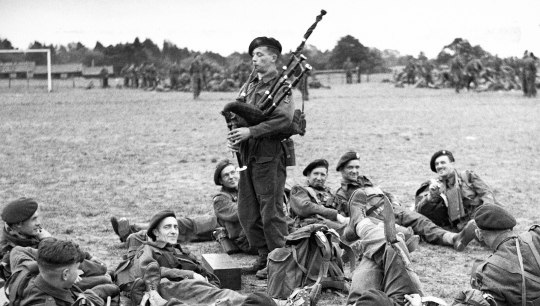


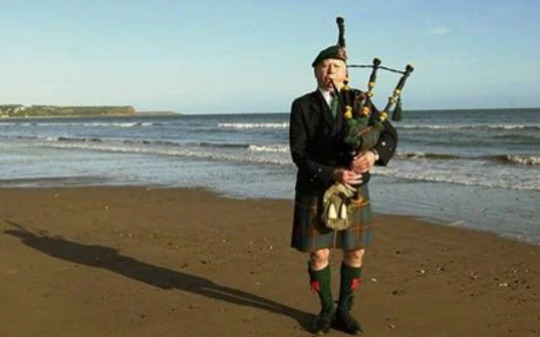
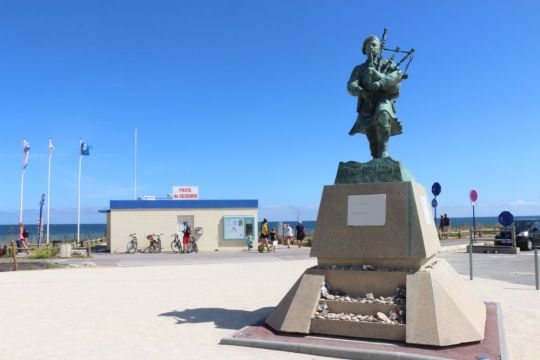
On June 6th 1944 Allied forces stormed the beaches of Northern France on what became known as D-Day.
There were no doubt many acts of bravery on that day when the tide started to turn against the Nazi regime that ultimately ended World War Two. I shall concentrate on one, but will also tell you about a German sniper that day and a wee tenuous brave Canadian.
‘Piper’ Bill Milllin landed on Sword Beach on the Coast of Normandy as part of the 1st Special Service Brigade in the second wave of the operation.
Pipers were banned from being on the frontline during the Second World War because of the number of casualties seen during the First World War. The enemy figured out that the piper helped boost morale to the Allied troops, and they were slaughtered because of this. This led the War Office to restrict their presence in camps as well as on the frontline.
Millin pointed this out to his Commanding Officer Brigadier Lord "Shimi" Lovat Fraser, hereditary chief of the Clan Fraser, who was a law unto himself. “Ah, but that’s the English War Office, Millin,” Lovat told him. “You and I are both Scottish so that doesn’t apply.”
As Bill Millin embarked from the landing craft and waded through chest high water making his way toward dry land, high above his head he carried his pipes, the only weapon he would need that day. Around him bullets flew, mortar shells exploded Bill_Millin1and his friends, comrades and countrymen died, but Bill carried onward.
It was what came next that made Bill Millin a legend! Lord Lovat, the Chief of Clan Fraser and Brigadier of the 2,500 commandos, instructed the 21 year old Bill Millin to fire up his pipes and play a tune to inspire the men. And with the five words ‘Give us “Highland Laddie” man!’, the Legend of ‘Piper’ Bill was born.
Amid the carnage and destruction Bill Millin played as he had never played before. While marching up and down the beach of Normandy, Millin played the tunes ‘Hielan’ Laddie’, ‘The Road to the Isles’ and ‘Blue Bonnets over the Border’, and at one point added ‘The Nut Brown Maiden’ for a redheaded French girl who had strayed out of her home.
The day would see Millin and his unit march four miles inland to a point known as Pegasus Bridge, which was a strategically vital point for the German 21st Panzer Division. D-Day was the turning point in the Allies’ battle against Hitler and ‘Piper’ Bill Millin stands a reminder of the bravery and sacrifice made by ordinary people in extraordinary times.
Facing the soldiers coming ashore that day was Horst Hrubesh, German machine gunner, he too can be seen as a hero of sorts, if you read the poem he penned, I will let you decide;
Scottish soldier play your pipes
Even though your in my sights
Just like me you have a wife
I aim above your head
For full five minutes i fire up high
Keep my bullets up in the sky
No mad piper, you will not die
I will not lay you dead.
Now at my Nazi captains call
He wonders why you do not fall
They drag me from my post in haste
Another gunner i am replaced
In a cell now i await
Whats sure to be a bloody fate
Jack boots stamp across the yard
By my cell with windows barred
Soldier friends i stood beside
Now gather in a long straight line
Blindfold no i did decline
To see their faces full of guilt
As they take my life for i shalt not kill.
Horst Hrubesh was German , but not a nazi, he paid the price for his act on D Day.

The third person to get a mention today is James M. Doohan who landed ashore at Juno beach. Later that day se would be shot 6 times, survive and go on to become Scotty on Star Trek.
Doohan was a commissioned lieutenant with the 14th Field Artillery Regiment of the 3rd Canadian Infantry Division, and was tasked with invading an area of Normandy code-named Juno Beach. As the meme states, Doohan successfully led his men across the beach littered with anti-tank mines, and also managed to take out two German snipers:
Lieutenant Doohan was however not shot by a German sniper. He had been shot by a nervous, trigger-happy Canadian sentry.
Doohan said. "We landed safely, thank God, through those Y-shaped steel barriers you see in the film, tracer bullets, all that, none of our men hurt, and dashed 75 yards to the 7-foot tall dunes," Doohan said.
"Crossed a minefield, found out about it later: It was meant to blow up tanks, and we weren't heavy enough. Moved up through a down - hardly a town just a village - called Graye Sur Mer, saw a church tower that was a machine-gun post, firing off to our left.
Doohan took out the machine-gun post with a couple of shots. "I don't know if they were killed or wounded, but it shut them up," he said. The Canadian soldier later said he didn't notice the gunshot wounds in his legs until he got to the medic who told him;
'You also have four bullets in your left knee.' I said: 'Well, I walked here.'"
#scotland#scottish#d day#world war two#history#piper bill millin#lord lovatt#James Doohan#Canadian#Soldiers#heroes#brave men#bag pipes
122 notes
·
View notes
Text
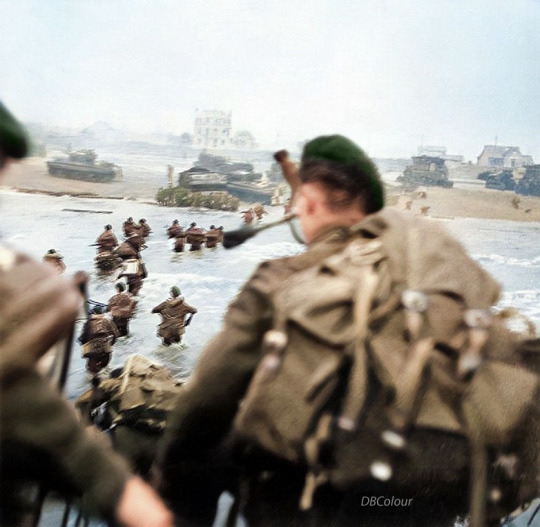
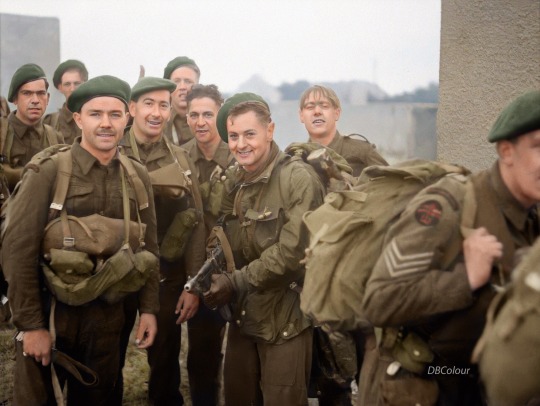
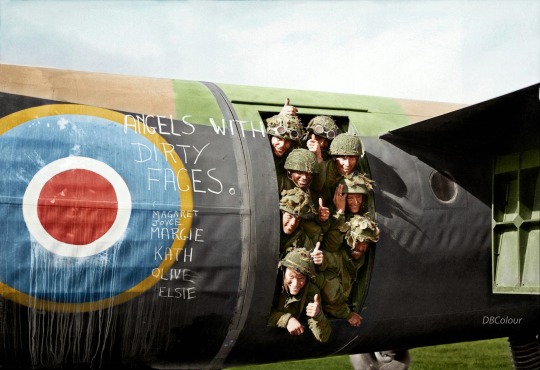
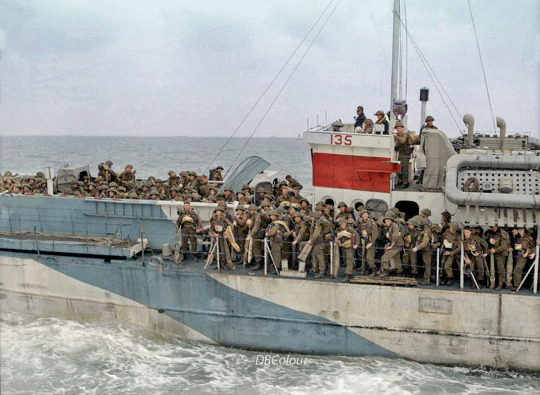
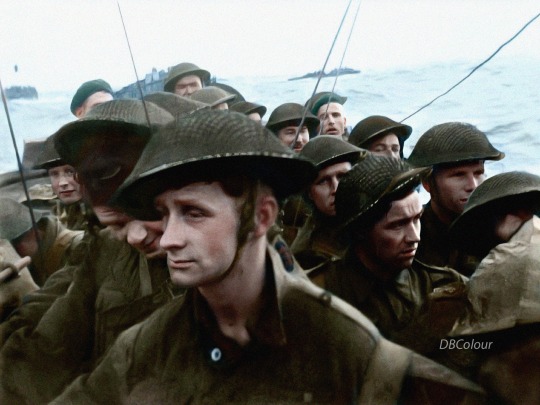
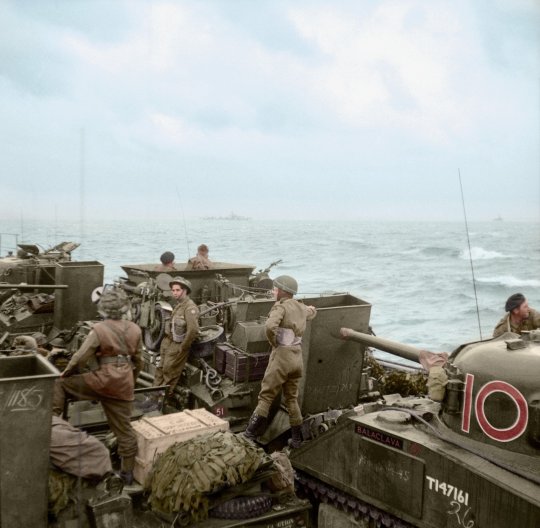
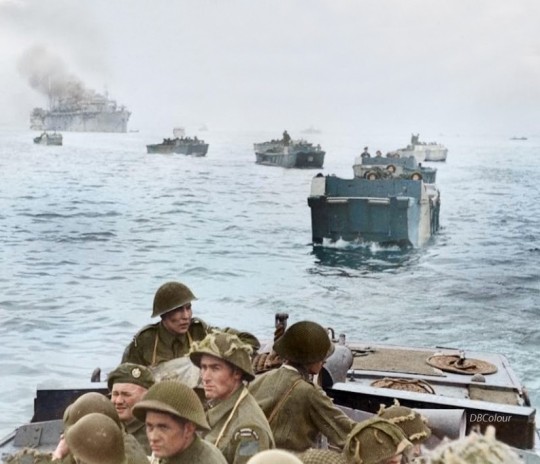
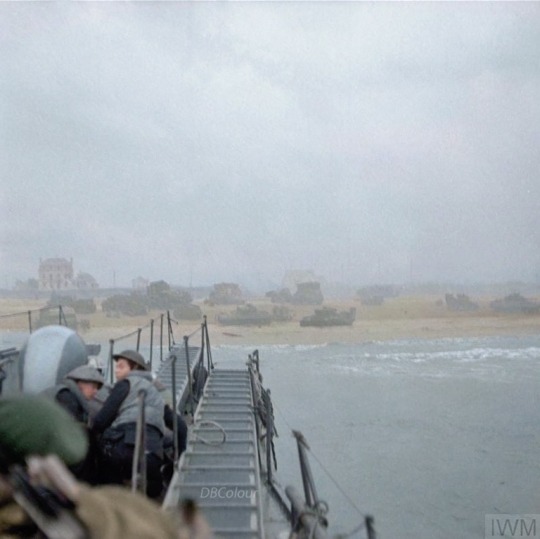
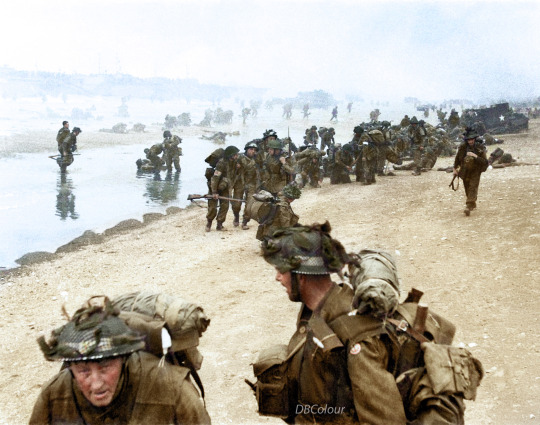
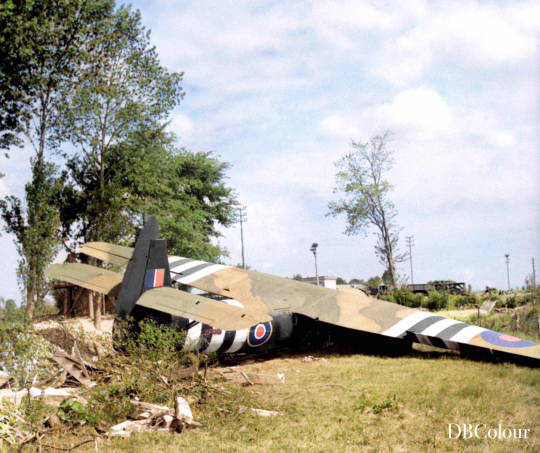
To commemorate the anniversary of D-Day, a short thread of photos colourised by DBColour (Colourising History on Facebook). Descriptions run from top-to-bottom.
Piper Bill Millin, seen here landing on Sword Beach with his bagpipes with Lord Lovat’s Commandos of 1st Special Service Brigade. IWM B 5103.
Commandos of 1st Special Service Brigade after landing on Queen Red beach, Sword area, 6 June 1944. British Airborne troops smile from the door of their Horsa glider as they prepare to fly out as part of the second drop on Normandy on the night of 6th June 1944. LCI(L) 135 of the 2nd Canadian (262nd RN) Flotilla carrying personnel of the North Nova Scotia Highlanders and the Highland Light Infantry of Canada en route to France on D-Day, 6 June 1944. (Library and Archives Canada Photo, MIKAN Nº. 3205043) Film still from the D-Day landings showing commandos aboard a landing craft on their approach to Sword Beach, 6 June 1944.
LCA (Landing Craft Assault) containing soldiers from the Winnipeg Rifles head for the Normandy Juno beach - June 6, 1944.
Commandos approach Sword Beach in a Landing Craft Infantry (LCI). Ahead, the beach is crowded with tanks and vehicles of 27th Armoured Brigade and 79th Armoured Division.
Troops of 3rd Infantry Division on Queen Red beach, Sword area, circa 0845 hrs, 6 June 1944. In the foreground are sappers of 84 Field Company Royal Engineers. Behind them, medical orderlies of 8 Field Ambulance, RAMC, can be seen assisting wounded men.
A Horsa glider near the Caen Canal bridge at Benouville, 8 June 1944. No. 91 (PF800), carried Major John Howard and Lieutenant Den Brotheridge of No.1 Platoon, 'D' Co., 2nd Battalion Oxfordshire and Buckinghamshire Light Infantry in the early hours of D-Day. © IWM B 5232
#d-day#d-day anniversary#ww2#world war 2#second world war#history#military history#british army#lest we forget#remembrance
303 notes
·
View notes
Text

The British 2nd Army, Commandos of the 1st Special Service Brigade, landed from an LCI(S) (Landing Craft Infantry Small) on ‘Queen Red’ Beach, the Sword Area, approximately 8.40 am on 6 June 1944. The brigade commander, Brigadier Lord Lovat DSO MC, can be seen striding through the water to the right of the column of men. The figure nearest the camera is the brigade’s bagpiper, Piper Bill Millin. Lord Lovat exercised his right as Chief of Clan Fraser to have a personal piper accompany him in the vanguard of the D-Day landings on Sword Beach
27 notes
·
View notes
Photo

Piper Bill Millin landing with Commandos of 1st Special Service Brigade from a LCI(S) (Landing Craft Infantry Small) on 'Queen Red' Beach, SWORD Area, at la Breche, Normandy, France. D-Day, 6 June 1944
40 notes
·
View notes
Text



Officer's Batledress Blouse of the 1st Special Service Brigade from the British Empire dated to 1944 on display at the Highlander's Museum in Inverness, Scotland
This uniform was worn by Brigadier Lord Lovat as Commander of the 1st Special Service Brigade. Lovat led this Commando formation during raids on Norway, Dieppe and then ashore on D-Day. Simon Fraser, 15th Lord Lovat was represented in the film The Longest Day, about the D-Day landings as wearing a white jumper and wielding a Mannlicher rifle. In reality he wore this uniform and used an American made M1 Carbine.
Lord Lovat instructed his personal piper, Private Bill Millin, to pipe them as they stormed the beaches despite specific orders not to. Private Millin cited these orders and army regulation. Lord Lovat reportedly replied with:
"Ah, but that's the English War Office. You and I are both Scottish, and that doesn't apply"
Despite this archaic attitude his championed the use of irregular warfare and Commando units during the war against the fascists.
Photographs taken by myself 2024
#uniform#military history#fashion#second world war#british empire#scotland#scottish#20th century#highlanders museum#inverness#barbucomedie
3 notes
·
View notes
Text

Bill Millin, a Scottish bagpiper who was among the first waves to invade the beaches on D-Day. Piper Bill walked up and down Sword beach playing highland tunes. Some Germans who claimed to have seen him didn't shoot because they believed he was crazy. He lived through the war, and died August 17, 2010.
0 notes
Text
"Mad Piper" Bill Millin, the only bagpiper to land on the beach in Normandy. While men fell around him, he played his pipes throughout the battle.

German snipers reportedly said they did not shoot him because they thought he was crazy and felt sorry for him.
Source
0 notes
Link
0 notes
Text
Striking a coin for his father: The ‘Mad’ Piper of D-Day
John Millin honours his father, Piper Bill Millin, in a poignant tribute by striking a 50p coin for the 80th Anniversary of D-Day. Stay tuned for the full exclusive interview coming TUESDAY.
youtube
View On WordPress
1 note
·
View note
Text
Relieved by commandos led by Lord Lovat and the piper Bill Millin:
youtube

Brit gliders next to Pegasus Bridge. In the early morning hours of D-Day, Brit glider borne troops seized the important Bénouville Bridge crossing the Caen Canal. The Brits held the bridge until relieved with forces fighting inland from the Normandy beaches. The bridge was renamed "Pegasus" after the flying horse patch on the airborne soldiers' uniform.
22 notes
·
View notes
Video
youtube
When you walk through the fire if you're lost in the dark I will tell you son, There are legends of heroes not many are true, But here is one Let me tell you some more 'bout Normandy And a name that will shine eternally A lad who was sent to a place you know well To play for his comrades on the road to Hell
#the mad piper#civil war#music#heavy metal#world war 2#ww2#normandy landings#piper bill millin#bill millin
1 note
·
View note
Text













On 17th August 2010 Bill Millin, piper to Lord Lovat at D Day, died, aged 88.
Millin had left Sandyhills near Glasgow to join the Highland Light Infantry, Queen’s Own Cameron Highlanders, No. 4 Commando.
On June 6th 1944, the 21-year-old had been ordered to play against the wishes of the top brass. He was the personal piper to Lord Lovat - who, despite there being a ban on pipers being allowed on the frontline, defied the War Office's orders and brought him to Sword Beach.
Pipers were banned from being on the frontline during the Second World War because of the number of casualties seen during the First World War. The enemy figured out that the piper helped boost morale to the Allied troops, and they were slaughtered because of this. This led the War Office to restrict their presence in camps as well as on the frontline.
After the war Bill settled in the lovely wee devon town of Dawlish, the museum there has his pipes on display as seen in the second pic, the first shows Bill at Edinburgh Castle in 2003.
The first pic is Bill, reunited with Josette Gouellain in Ranville, Normandy. The two met 50 years ago when Josette asked bill to play something just for her. The Scot complied with "The Nut Brown Maiden" in admiration of the little girl's hair and eyes.
70 notes
·
View notes
Video
tumblr
This video has got me like

#ww2#world war 2#world war two#second world war#bill millin#pipe band#piper#pipes#bagpipes#scotland#scottish#scots#british army#history#military history#Scottish history
1K notes
·
View notes
Text
MAG007, The Piper
Case #9220611, Clarence Berry Release date: April 7, 2016 First listen: 14th October. Out on the morning feed, I remember Clarence Berry talking about ‘meeting the war’ as I passed along side our predator proof fence, some 9 feet high and concrete.
OK, when I say I go off the deep end in this one...
Our first dive into what could be called historical statements, and plucking a name I know quiet well from both History and English literature classes.
- I don’t need to present too many numbers to you to tell you that Staff Sargent Clarence Berry was, indeed, lucky. Or incredibly unlucky, depending on how you slice it. 4 years at the Eastern front, when the average life expectancy was allegedly 6 weeks. The average day saw 6000 dead. It goes on. He was lucky to miss out on the Somme, where the allies bough 6 miles of ground with 60,000 causalities, 20,000 of them deaths. I don’t think they could hold onto it.
- I’ll try and stop. This isn’t a history lesson. It’s just an example of how numbers can be used to fuzz the edges of the horror of it all. Numbers don’t mean the same as names.
- At the name drop of The Piper, I’ll confess a chill went through me. I had years in the army cadets, but in UOTC at a Scottish Uni, I was introduced to the pipes and drums. A lot of people will decry the bagpipes as ‘not a musical instrument’, and I think I’d agree with them but not for the reasons they’d expect. A lot of instruments have served with the regiments; brass bands, drums, any number of pipes. Things that carry over the march of feet or the tumult of battle. And most have been ‘rehabilitated’ into the orchestra pit or the band stand. But not the bagpipes. The instrument that drones and cries against all logic of how the beast breathes. I think it strikes the same ancient fear response that the Carnyx did. They carry. And with the music, they carry battle.
- I know it’s the wrong war, some 30 years too early, but at the name ‘The Piper’, I thought of 21 year old Private Bill Millin on D-Day.
- Clarence Berry speaks of growing up poor and joining the army as soon as he was old enough. And you’d think 100 years on or so, we wouldn’t be seen it, but we do. Recruiters hanging around universities, promising to take care of folks and that student debt if they only signed up and served. It chokes me a little, to think how many have aligned with The Slaughter to escape The Buried. I know, I’m over simplifying, and there are many that can speak much finer on it than I, folks who have been through the system. I just need to simplify it for myself, because the enormity of it is terrifying.
- ‘Boredom… it has a quiet terror all its own.’ The anticipation, the dread, it must have been exhausting.
- I think the introduction and description of Wilfrid Owens’ initial impression on Clarence Berry and his men could be applied to so many officers. Officers were of a social rank, at least initially before heavy losses, many mistaking good breeding as a hallmark for ‘ability to lead men’, ‘think tactically’ and ‘being able to keep one’s shit together.’ In reality, a lot of them were recent graduates, armed with a hand gun, orders that even they despaired of and Sam Browne belt telling an enemy sniper were to aim.
- ‘It came as no surprise to me when he mentioned he wrote poetry.’ I feel this carries the same sort of weight as a certain breed of white straight man, in today’s setting, mentioning he has a podcast.
- ‘Every time he tried to put the war into words it just sounded trite.’ I can not recall how many hours I spent on WWI poetry during English Literature classes and I hated every second of it. I’m not sure why, I couldn’t say it was bad per say. Nothing sticks with me. At least nothing that hasn’t be turned into song. I think it was the melancholy of it all, when what burned through me while studying the text and context, was fury. That it had come to this. And the knowledge it would happen again, within a generation. I was furious when all the poets seemed to focus on the tragedy of it all in great, detached sort of ways, not the white hot grief that I had no idea what to do with. But it’s strange, now I think about, that the words stay with me in songs, like adding melody helps then carry.
- ‘He longed to be remembered, to take what this war truly was and immortalise it.’ Monkey’s paw my dude.
- I looked up Savy Wood in the Aisne region of northern France. There’s a British cemetery with 430 identified causalities buried there.
- ‘All you could do against artillery was pray.’ I think WWI saw artillery used in a way that had never been seen before. Yes, large projectiles had been used in warfare for millennia and even cannon fire wasn’t any thing new. But the bombardments would go on. And on. And on. Like a siege that could have you buried alive or blown apart at a moment’s notice.
- ‘(He) turned his head to listen’. I think this is the second mention of Wilfred tilting or turning his head to listen. It put me in mind of the time one of my teacher’s mentioned at a parents’ evening, how I’d cock my head when something interested me. He fondly said it was like having a spaniel in the class room. If this head tilt is interest, is picking up the sound, it does make me think of a dog. And that leads me to Shakespeare’s ‘Cry havoc and let slip the dogs of war,’ said by Mark Antony, envisioning the ghost of Caesar, rallying his own avenging. Another ghostly figure, commanding the battlefield.
- Barbed wire and mud. Disease was as much if not more of a threat to the average soldier then enemy fire. Antibiotics were not yet a thing. TB, pneumonia, dysentery, septicaemia, gangrene, tetanus. The list goes on.
- ‘Whistling tune was unmistakable’. Whistling. Whistles were used to signal an advance out of the trenches. Whistling could be the only warning you got of an incoming mortar.
- ‘And in that moment I knew what was about to happen. I looked at Wilfred, and as our eyes met I saw that he knew as well.’ I think this line a strange insight into how The Slaughter works. There’s a terrible uncertainty in war, right up until there is an even more terrible certainty. The not knowing up until the realising. I don’t think ‘realising’ is the same as ‘knowing’. ‘Knowing’ suggests some autonomy, some will. ‘Realising’, well, more often than not it’s out of your control. This may been why The Slaughter was able to halt The Stranger's earlier attempt at a ritual. The Unknowing brought down by the more terrible certainty. And every time I hear Berry mention ‘the strange music’, I can’t help but feel The Slaughter and The Stranger were more similar in their methods than previously thought.
- ‘Most definitely alive’. Is it me, or does this feel a little over sure? Like definitely alive and in no way being sustainable by unknowable powers?
- ‘the sweet scent of decaying flesh and the moans of pain and despair.’ We’re still a ways away from ‘Tales of a Field Hospital’, but there are constants.
- ‘ I met The War’. I might have capitalised it different from how it may be in the transcripts, but the way Wilfred says it, to me, it feels like he met The War. Not This War, but that which rides a red horse at the end of days and has been riding since The Beginning. The War.
- Three Faces. The imagery of three faces can be seen through history; Hecate, the furies, the 3 witches. But the one that caught my eye was the Japanese proverb of everyone having three faces; 1 for strangers, 1 for loved ones, and 1 for no one but yourself. And between the pipe playing, the screaming, the brandishing of weapons, the begging for mercy, the saluting, and the vomiting of blood and earth, I don’t know if I could confidently say just which was which.
- Being handed a pen to play its’ tune in return fr his life… yup definitely being sustained by an unknowable power… also I think we just witness a warlock pact?
- Dog tags of Joseph Rayner… Rayner?! WHAT!? Jonny? Jonny, is this just your name hygiene flaring up again or is this a Thing?
- ‘Flamethrower that marked me so distinctively’… So, Sir, would you consider yourself touched by both The Slaughter and The Desolation? Any others we should know about?
- The men who hear the Piper not making it back. I love this observation made by Berry, about Hamlin, the Germany town and the children lost to an older generation’s greed and arrogance.’Still, those are musings for poets, among whom I do not number.’ I wouldn’t sell yourself short Sargent.
- ‘This charged our commanders to spur us on to more and more aggressive actions, trying to push Germany into a surrender.’ The deaths that happened at the close of the WWI, possibly enrage me the most. Because it was ending. It was a war of attrition and Germany was bleeding out faster. There was no need to push, no need to attack the lines when it was an open secret that the surrender would be coming through in a few hours. But there were numerous instances in the last days of the war where assaults were made on positions for ‘glory’ and ‘honour’ and what ever horse shit was being peddled by the top brass at that stage.
- ‘I saw him cast a shadow that was not his own.’ The Slaughter makes a Stranger of another man.
- There’s something terribly sad about this portrayal of Owens. Aware of his own mortality and the debt that must be paid with the end of the war in sight. Knowledge that his continued survival means the damnation of other.
- ‘The bullet hole simply opened, like an eye.’ No longer ‘realising’, but ‘knowing’?
- The whiplash of going from that to the Archivist bitching about Gertrude’s filing.
- The Slaughter is an odd beast to me. We learn, eventually, that The Entities have been around for as long as they could be conceived of. And there’s always been war, even before humans were humans. We’re not alone in committing violence on our own kind as a species. But I imagine that it is The Entity that has undergone the most transformation over the millennia, that has felt its’ reach swell in waves like possibly no other, except perhaps The Corruption in the wake of pandemics.
- War, in all its’ forms, has changed so much. How it is waged, where it is fought, who is caught up, how it is perceived, what is justified as an acceptable sacrifice in its’ name. How it will ingratiate itself by stealing the faces of paragons; Justice, Liberty. And have a few closer to it sneak in at the edges; Retribution. I think The Slaughter is one of the most fascinating of The Entities, not only in the way it can hold the entire world in a barbed wire grip but also how the fear can drain and numb to the point that it chokes out hope. The Slaughter is terrifying because if it pushes long and hard enough, you may just lie down and accept it.
4 notes
·
View notes
Photo

William "Bill" Millin (14 July 1922 – 17 August 2010), commonly known as Piper Bill, was personal piper to Simon Fraser, 15th Lord Lovat, commander of 1 Special Service Brigade at D-Day. ** Millin is best remembered for playing the pipes whilst under fire during the D-Day landing in Normandy.Pipers had traditionally been used in battle by Scottish and Irish soldiers.However, the use of bagpipes was restricted to rear areas by the time of the Second World War by the British Army. Lovat, nevertheless, ignored these orders and ordered Millin, then aged 21, to play. When Private Millin demurred, citing the regulations, he recalled later, Lord Lovat replied: "Ah, but that’s the English War Office. You and I are both Scottish, and that doesn’t apply." He played "Highland Laddie" "The Road to the Isles" and "All the blue bonnets are over the border" as his comrades fell around him on Sword.Millin states that he later talked to captured German snipers who claimed they did not shoot at him because they thought he had gone mad. ** Lovat and Millin advanced from Sword to Pegasus Bridge, which had been defiantly defended by men of the 2nd Bn the Ox & Bucks Light Infantry (6th Airborne Division) who had landed in the early hours by glider. Lovat's commandos arrived at a little past one p.m. at Pegasus Bridge although the rendezvous time in the plan was noon. To the sound of Millin's bagpipes, the commandos marched across Pegasus Bridge. During the march, twelve men died, most shot through their berets.Later detachments of the commandos rushed across in small groups with helmets on. Millin's D-Day bagpipes were later donated to Dawlish Museum. A set of pipes he used later in the campaign, after the originals became damaged, were donated to the now "Pegasus Bridge Museum".
27 notes
·
View notes
